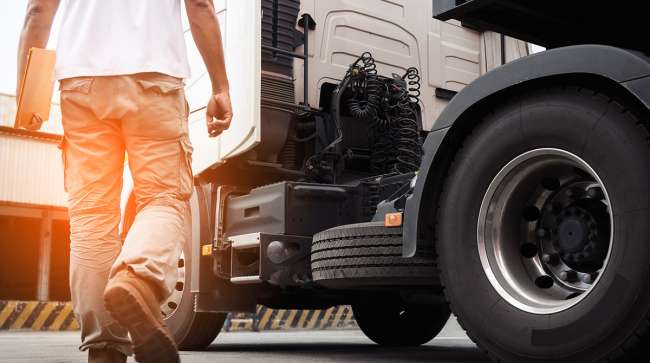Senior Reporter
Labor Department Drops Independent Contractor Rule

[Stay on top of transportation news: Get TTNews in your inbox.]
The U.S. Department of Labor has announced the withdrawal of a federal regulation for classification of independent contractors that the agency earlier said would “promote certainty” for the trucking industry’s use of contractors, but which it now maintains would introduce “substantial confusion and uncertainty on the topic.”
“Upon further reflection, including consideration of relevant [public] comments, the department does not believe that the independent contractor rule would have achieved the added clarity it intended to provide to the regulated community,” the May 5 withdrawal announcement said. “Businesses operating nationwide would have had to familiarize themselves with multiple standards for determining who is an employee under the Fair Labor Standards Act across different jurisdictions.”
The rule, posted in the Federal Register on Jan. 7 in the waning days of the Trump administration, was due to take effect on March 8 but was delayed after the Biden administration took office.
Effective May 6, we have withdrawn the Independent Contractor Rule in order to maintain workers’ rights to the minimum wage and overtime compensation protections of the Fair Labor Standards Act: https://t.co/NP25ns7bxi — US Labor Department (@USDOL) May 5, 2021
The DOL announcement noted that the rule’s withdrawal was consistent with a Jan. 20, 2021, memorandum from the assistant to President Biden and chief of staff, calling for a regulatory freeze of all rules while the new administration reviews major policy decisions in play.
The rule was generally regarded as favorable to the trucking industry’s use of independent contractors, as it offered a federal standard other than the so-called “ABC test” used in the California Assembly Bill 5 law to determine whether a truck driver is an employee or independent contractor. That rule is being challenged in court by the California Trucking Association.
ABC Test
The three-pronged ABC test dictates that a worker is considered an independent contractor to whom a wage order does not apply only if the hiring agency establishes:
- A: That the worker is free from the control and direction of the hirer in connection with the performance of work, both under the contract for the performance of such work and in fact.
- B: That the worker performs work that is outside the usual course of the hiring entity’s business.
- C: That the worker is customarily engaged in an independently established trade, occupation or business of the same nature as the work performed for the hiring entity.
The DOL rule had won support in the trucking industry, and its proposed withdrawal last month drew unfavorable reaction.
American Trucking Associations criticized the decision to withdraw the rule, saying, “ATA is disappointed that the Department of Labor would choose to put the interests of trial lawyers and union bosses ahead of the interests of small businesses and entrepreneurs – including the more than 350,000 owner-operators who currently choose to be independent truck drivers. By undoing this common sense regulation that protected the way of life for owner-operators in trucking, the Department of Labor is putting the integrity, efficiency and safety of the supply chain in jeopardy and we urge them to reconsider.”
In written comments, the Owner-Operator Independent Drivers Association and many trucking contractors also opposed dropping the final rule.
“Prong B of the ABC Test is most problematic for leased-on owner-operators because they are performing work that is in the usual course of the hiring entity’s business — hauling freight by truck,” OOIDA wrote. “Because they are unlikely to satisfy Prong B, leased-on owner-operators would be classified as employees if they want to continue working with carriers.”
In the withdrawal announcement, DOL said, “The independent contractor rule’s guidance would complicate rather than simplify the analysis for determining whether a worker is an employee or independent contractor under the FLSA. Given the likelihood that many courts would ignore, reject or not defer to the rule’s guidance, the department believes that the rule would have introduced substantial confusion and uncertainty on the topic of independent contractor status, to the detriment of workers and businesses alike.”
DOL originally said the contractor rule was consistent with the FLSA’s text, its purpose and the department’s experience administering and enforcing the act. The contractor rule explained that two of the “core” factors — the nature and degree of the worker’s control over the work and the worker’s opportunity for profit or loss — are more “probative of the question of economic dependence or lack thereof than other factors, and thus typically carry greater weight in the analysis than any others.”

The year is 2039. Zero-emission, electric heavy-duty trucks roll past you on the highway. Charging ports are now commonplace at terminals and truck stops. Diesel-powered vehicles are becoming a thing of the past. You sit and wonder: How did we get here? Here, in 2021, Daimler Trucks North America's head of eMobility speaks to RoadSigns. Hear a snippet above, and get the full program by going to RoadSigns.TTNews.com.
The contractor rule also said that three other factors could serve as additional guideposts in the analysis: the amount of skill required for the work, the degree of permanence of the working relationship between the worker and the potential employer, and whether the work is part of an integrated unit of production.
“The department believes that the rule is inconsistent with the FLSA’s text and purpose, and would have a confusing and disruptive effect on workers and businesses alike due to its departure from longstanding judicial precedent,” DOL said in the May 5 announcement. “Having considered the comments submitted in response to the withdrawal notice of proposed rulemaking, the department has decided to finalize the withdrawal of the independent contractor rule.”
Want more news? Listen to today's daily briefing below or go here for more info:




